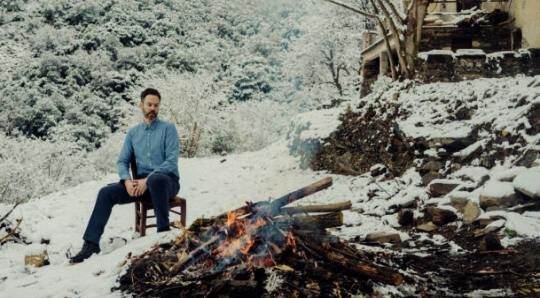|
Piers Faccini creates with a quiet restlessness. His songs, painstakingly crafted, seem nonetheless to want to take him further on. He has collaborated with artists as far-flung as Vincent Segal, Ibrahim Malouf, Blick Bassy, and Mayra Andrade, as well as Ben Harper and Abdelkebir Merchane who are featured on his new album, Shapes of the Fall. He, and they all, are thinking, engaged artists with soul, helping to make the world smaller and bigger at the same time.
Faccini has put together a bewitching mix of shapes. There are topical and poetic musings, songs of love, even a couple of foot stompers. A number of the tracks celebrates the irrepressible Maghrebbi roots of his Southern Italian patrimony, showcased in the magical mystery music (and musicians) of the Gnawa and other tribal keepers of North African traditions. Snippets of West and Southern African strains are interwoven into the songs as well as into others reminiscent of the British Isles of his mother’s antecedents and his childhood.
His work heretofore has been characterized by elegy and toothsome, evocative lyrics. Shapes of the Fall turns a corner by adding muscle to the elegy, most notably with the guembri, or sintir, a deep-sounding, camel-clad, two-stringed Gnawan bass, performing in counterpoint to Faccini’s lulling tenor. Other nomadic instruments, such as the karkabous (shuffling metal castanets) and various drums add authenticity and excitement as well.

|
|
We could be on a Mississippi-banked plantation as “Foghorn Calling” begins, sultry, and deeply bluesy; karkabous and bass drum become more assertive, and the rhythm intensifies so, that you can feel the call of trance within you. “Foghorn Calling” abounds in metaphor and alliteration. The image of coming out of “darkness,”—its deliverance conveyed by Faccini’s guitar repeatedly bellowing a dark electronic simulation of the foghorn—drives the song. And, as he repeats “Drag forth the darkness from you,” the immediacy of breaking through the gloom, the menace, the unknowable, is palpable, although not yet illuminating.

|
|
Also trancelike is “Dunya,” introduced by Faccini’s wail in falsetto that will later blend into a chorus, strings and a snare drum to create a melancholic, lovely palette of unusual but not dissonant sounds. Faccini uses a quartet of stringed instruments sparingly throughout; here it expresses a number of tonalities offset by the snare drum that to give assertive accents to Faccini’s high-registered vocals and guitar. “Dunya’s” blending of western sounds into the Arabic blueprint of the tune is seamless and sophisticated.

|
|
Faccini’s acoustic guitar gives the listener of “Lay Low to Lie” just a few, solemn opening bars of what could be an English ballad, and then Malik Ziad’s vibrating guembri comes forefront adding a heartbeat to the song, a deeply affecting lament that cries for understanding before the inevitability and imminence of death. The stringed instruments return with some bittersweet lines and the tempo picks up, without mitigating the sadness, making the doleful song seem merely more earnest now. A brief chorus reminiscent of a mini gospel choir slips in behind Faccini’s acoustic guitar returning the song to a mostly “Western” and real-time setting. There are a number of evocative elements in this song, including Faccini’s lyrics of lament; together they paint an exquisitely sorrowful tableau.
“The Real Way Out” is a reverent ripoff of Paul Simon, though Faccini is characteristically more eloquent (and less glib) with lyrics like, “You were the blood kissed by the thorn,” and “drown in the dust of a drought.” The title and refrain, “I wanted in when the real way was out,” fits Simon to a T, and Faccini’s background chorus’ short riff on Ladysmith Mambazo is defensible highway robbery.
Despite its mostly soft-spoken affect, Shapes of the Fall has impact. It doesn’t worm its way into the ear, but leaves one feeling they’ve been on a voyage on uncharted seas under the stewardship of a seasoned, searching captain with, so to speak, many miles before he sleeps.
Find the artist online
Further reading:
David Walters - Nocturne
Ballaké Sissoko - Djourou
|
